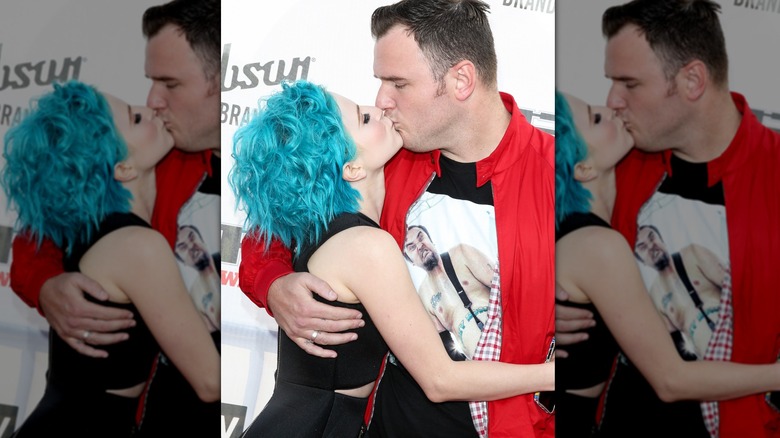The Tragic Real-Life Story Of Paramore's Hayley Williams
Punk music, and its subgenre of emo, seems tailor-made for teenagers. Sarcasm, exhibitionism, and aggression masking inner emotional turmoil are calling cards of many an adolescent experience, and punk and emo trade heavily on all of them. But it still caught some music critics by surprise that Paramore was a band made up of teenagers. Hayley Williams was only 14 when Atlantic Records approached her — and when she subsequently defied their pressure to be a solo artist. It was on her initiative that her friends from home were recruited to form Paramore.
As part of the band, Williams won praise for the depth shown in their songwriting, and as the vocalist, she took the lion's share of accolades as Paramore emerged from a cult band into an internationally recognized group. With success has come cameos with other groups, a Grammy, and even an eventual stint as a solo artist in the late 2010s. But from her earliest years, Williams has known a good measure of the kind of tragedy, heartbreak, and hardship that informs her chosen genre, tragedies sometimes directly reflected in her work.
Her parents' divorce and remarriage meant a volatile childhood
Hayley Williams has said that her earliest memory was of her parents fighting. She was born in Meridian, Mississippi, in 1988 to parents she describes as "kids" at the time — kids who made a mistake in getting married. The fight that Williams claims as her first memory was what propelled them to divorce. Only 4 years old at the time, Williams assumed the blame for her parents' split.
Like many children of divorce, she found herself moving back and forth between houses, in a town she always felt was the wrong place for her. Both her parents remarried, but in her mother Cristi's case, remarriage landed her in an abusive and volatile relationship, a situation often repeated throughout her family's history. The situation deteriorated to the point where Christi Williams felt escape was necessary, and in 2002, she took her daughter and ran away to Franklin, Tennessee.
Christi eventually reconnected with a friend from high school, Scott Gilbert, and remarried again. But for Williams, who was almost 13 when they fled Mississippi, that episode was transformative. "I knew almost immediately, when we got past the state line — now my life is starting. You know?" she told The New Yorker. And the fragmented nature of her home life left her yearning for a family group, a yearning she would try to satisfy through music.
The state of the music industry when she broke in left Williams with a lot of self-loathing
Hayley Williams' choice to push her record company to surround her with a band, rather than promote her as a solo artist, wasn't just because of her young age. Women and girls were a big part of the target audience of punk music, but rarely fronted groups in the 2000s. For years, Williams was the only female performer when Paramore went on tours with other bands, and the genre's culture has been described as outright hostile to women.
Ever since punk was invented, misogyny has been evidenced not only in the predominately male musicianship, but in attitude and content. Williams spoke to NME about a performance with Warped Tour that was full of aggressive, stereotypically masculine behavior, recalling, "It was like if I didn't spit further, I felt like someone was going to throw me out." The lyrics of many punk songs from that era were also blatantly misogynistic — including those by Paramore. Williams drew inspiration from her own diary for "Misery Business," a song about a girl's spite toward another girl for stealing her boyfriend, expressed through insults.
Given the state of the punk scene at the time, Williams internalized the need to be "one of the guys," and some of the misogyny around her. Looking back years later, she told NME, "I hope no young female experiences the s*** that I experienced."
The family she sought to make through Paramore kept splintering
For Hayley Williams, Paramore was a surrogate family. It was initially made up of her friends from Franklin, Tennessee: Josh Farro and Jason Bynum on guitar, Zac Farro on drums, and Jeremy Davis on bass. But Paramore would prove to be a volatile family group, as relationships between members were strained by success and worldviews. Within a few years of Paramore's forming, the Farro brothers walked away. Josh Farro later took to his blog, accusing Williams's father of being an overbearing manager, Davis of bad behavior that led to multiple dismissals, and Williams (who had a brief relationship with Josh) of writing lyrics that went against his Christian beliefs.
The younger Zac eventually rejoined Paramore, with Josh's blessing. But an even more contentious split came when Davis left in 2015, and sued the band over credit, royalties, and a partnership in Paramore's business arm. Davis was outspoken in his hard feelings toward Williams, who maintained (along with the rest of Paramore) that the legal proceedings kept them from public comment. The lawsuit was settled in 2017.
For Williams, who still looked on Paramore as a family, the ongoing drama took its toll. Worn down by the splits and infighting, particularly with Davis, Williams herself left the group she co-founded, putting Paramore into hiatus. "I wasn't OK for a while," she told The Guardian. Battling depression, she was only slowly coaxed back into the band by guitarist Taylor York.
Her marriage fell apart over adultery
While Paramore's band dynamic was complicated and her parents' relationships volatile, Hayley Williams did have a model for a stable, happy family: her grandparents, who met at 12 years old and went on to form a lasting marriage. It was their example that Williams sought to emulate in her relationship with Chad Gilbert, guitarist of New Found Glory. The two came together in 2008, and spent several years as a couple before they married in 2016. But despite that long-laid foundation, Williams and Gilbert divorced within a year.
Williams was reluctant to say too much about the relationship's breakdown as of 2020, not wanting to fall into public acrimony. But she did tell The Guardian that, after it was over, she realized she'd recreated her parents' marriage instead of her grandparents. "I was in a very unhealthy relationship, and I just kept thinking: 'I can fix it this time.'" Closer to the divorce, she also named the reason for the split: Gilbert's infidelity.
Following the divorce, Williams moved to a small house, the first she had ever lived in alone. It was an experience she found both romantic and lonely, the latter trait exacerbated by the circumstances. The breakdown of her marriage happened while Paramore was working on their album "After Laughter," and by the time its tour ended and she came back to that house, the full impact of the breakup hit her.
She's had ongoing issues with depression
Following Paramore's split with Jeremy Davis, her own brief departure from the band, the end of her marriage to Chad Gilbert, and the tour of Paramore's "After Laughter," Hayley Williams realized that she was in trouble. In an essay for Paper in 2018, she expressed a reluctance to call the mental health crash she experienced as depression, stating: "Mostly out of fear people will put it in a headline, as if depression is unique and interesting and deserves a click. Psychology is interesting. Depression is torment." But by her own admission, she found herself not eating, sleeping, or laughing. She also found herself unsatisfied with any lyrics she came up with for Paramore songs in the works.
For a time, Williams had suicidal thoughts, a dilemma she later incorporated into her first solo album, "Petals For Armor." The project became an outlet for sources of depression and anger from throughout her life, from the affair that began her relationship with Gilbert, all the way back to the history of abuse among the women in her family. In between "After Laughter" and "Petals For Armor," Williams also entered therapy. Her therapist gave her perspective on her anger and the encouragement to keep writing. Around the same time, she forged a deeper connection with Paramore guitarist Taylor York, who has also experienced depression, and reconnected with Zac Farro.
She was diagnosed with PTSD
After entering therapy, Hayley Williams was told that she had post-traumatic stress disorder. "It was my physical body that started demanding that I pay attention to choices I was making," she said in a New Yorker interview of the road to diagnosis. "All those things that I ignored — my body didn't want me to let it go. So it kind of broke down on me." She likened the feeling induced by PTSD, the sensation that everything was falling apart around her, to a cartoon piano dangling over her head.
After being diagnosed, Williams dived into science books to get a better handle on how her body was being affected. But she also had to confront a certain image of herself as an artist and as a person.
Williams recognized that, as with many people, there's a romanticism to a reckless lifestyle tinged with trauma and isolation, but such an outlook can make it difficult to adjust and get better. Besides lifestyle changes, Williams went on an antidepressant, something she took as a turning point. "It was like, 'If I take this I cannot hold on to this old narrative any more,'" she told NME. "'I have to be willing to move into a new season of my life that's about more positive s***.'"
One of her songs was about her grandmother's near-death accident
Tragedies throughout Hayley Williams's life have informed the lyrics of several of her songs. The strain of quarantine during the COVID-19 pandemic informed "C'est Comme Ça" from "This Is Why." The suicidal thoughts that came in a depressive episode informed lines in the song "Leave It Alone" from her "Petals for Armor" solo album. And that song had additional fuel from a near-death experience by one of her closest relatives.
In an interview with Zane Lowe for Apple Music (via Alternative Press), Williams said that while she was working on "Petals for Armor" — a mentally and emotionally tough process — she got word that her 81-year-old maternal grandmother had taken a fall down the stairs. She and Williams had long been close, and working through past traumas had left Williams especially anxious about losing those close to her. Her grandmother survived the fall, but she couldn't remember the accident or much else. She still recognized her daughter and granddaughter, but as Williams put it, "she's not really here with us."
There were other deaths close to Williams at the time, and it became an overwhelming experience. "What is the point of loving people?" she asked herself. "Even in the best case scenario is I fall in love, we have a life together and then we lose one or the other. It's terrifying." It was this feeling that sparked "Leave It Alone."
A lung infection derailed Paramore's reunion
Since her diagnosis, Hayley Williams has made a conscious effort to focus more on the positive aspects of her life, and she recommitted herself to her work and her band. In 2023, Williams, Taylor York, and Zac Farro reunited as Paramore, now a trio, for their first album in six years, "This Is Why." The reunion helped keep Williams going, and it represented the first time that Paramore's line-up hadn't changed between albums.
With the new album came a new tour, and Paramore dutifully hit the road. But while on the road, Williams began to feel unwell. She was reluctant to stop and get herself checked; "[playing for crowds] was really healing for me," she told Rolling Stone, but she reached a point where she couldn't go on. After a show in Seattle on August 9, Paramore announced that all their remaining shows were to be canceled because Williams was suffering from a lung infection.
She had been diagnosed before the cancelation, and hoped that a short break would let her heal enough to finish out the tour. But the unspecified infection was severe enough for Williams to comment on social media, saying that she risked "long-term damage" and that her health had gotten "scary" (via People). However upsetting cutting the tour short would be, she didn't have a choice.
If you or anyone you know may be the victim of domestic abuse, needs help with mental health issues, or is struggling or in a crisis, contact the relevant resources below:
-
The National Domestic Violence Hotline at 1−800−799−7233. You can also find more information, resources, and support at their website.
-
The Crisis Text Line by texting HOME to 741741, call the National Alliance on Mental Illness helpline at 1-800-950-NAMI (6264), or visit the National Institute of Mental Health website.
-
Call or text 988 or chat 988lifeline.org








